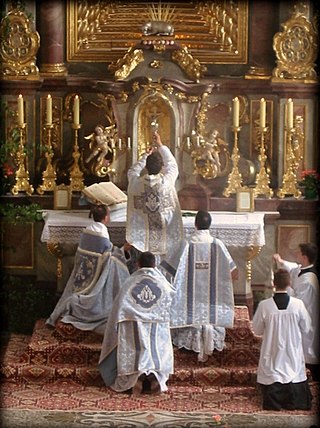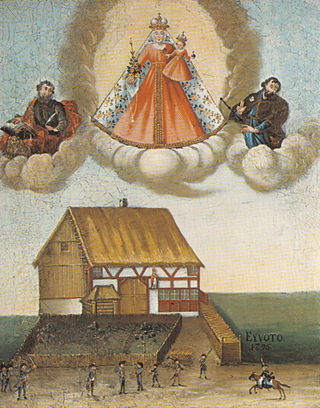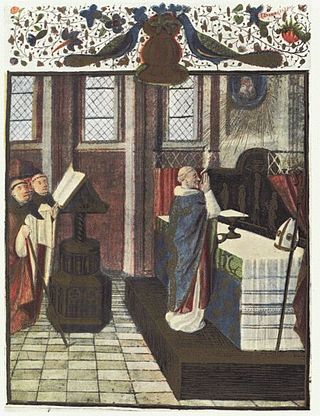
The Tridentine Mass, also known as the Traditional Latin Mass or the Traditional Rite, is the liturgy in the Roman Missal of the Catholic Church published from 1570 to 1962. Celebrated almost exclusively in Ecclesiastical Latin, it was the most widely used Eucharistic liturgy in the world from its issuance in 1570 until the introduction of the Mass of Paul VI.

Vespers is a liturgy of evening prayer, one of the canonical hours in Catholic, Eastern Orthodox, Oriental Orthodox, and Lutheran liturgies. The word for this fixed prayer time comes from the Latin vesper, meaning "evening".
The Good Friday prayer for the Jews is an annual prayer in the Christian liturgy. It is one of several petitions, known in the Catholic Church as the Solemn Intercessions and in the Episcopal Church as the Solemn Collects, that are made in the Good Friday service for various classes and stations of peoples: for the Church; for the pope; for bishops, priests and deacons; for the faithful; for catechumens; for other Christians; for the Jews; for others who do not believe in Christ; for those who do not believe in God; for those in public office; and for those in special need. These prayers are ancient, predating the eighth century at least.

Intercession or intercessory prayer is the act of praying to a deity on behalf of others, or asking a saint in heaven to pray on behalf of oneself or for others.

The kiss of peace is an ancient traditional Christian greeting, also called the holy kiss, and sometimes the "brother kiss", or the "sister kiss". Such greetings signify a wish and blessing that peace be with the recipient, and besides their spontaneous uses they have certain ritualized or formalized uses long established in liturgy. Many denominations use other forms of greeting to serve equivalent purposes; these include handshakes, gestures, and hugs, any of which may be called a sign of peace.
In the Western Church of the Early and High Middle Ages, a sacramentary was a book used for liturgical services and the mass by a bishop or priest. Sacramentaries include only the words spoken or sung by him, unlike the missals of later centuries that include all the texts of the mass whether read by the bishop, priest, or others. Also, sacramentaries, unlike missals, include texts for services other than the mass such as ordinations, the consecration of a church or altar, exorcisms, and blessings, all of which were later included in Pontificals and Rituals instead.

The Exsultet, also known as the Easter Proclamation, is a lengthy sung proclamation delivered before the paschal candle, ideally by a deacon, during the Easter Vigil in the Roman Rite of Mass. In the absence of a deacon, it may be sung by a priest or by a cantor. It is sung after a procession with the paschal candle before the beginning of the Liturgy of the Word. It is also used in Anglican and various Lutheran churches, as well as other Western Christian denominations.
The Gallican Rite is a historical form of Christian liturgy and other ritual practices in Western Christianity. It is not a single liturgical rite but a Latin liturgical rites that developed within the Latin Church, which comprised the majority use of most of Western Christianity for the greater part of the 1st millennium AD. The rites first developed in the early centuries as the Syriac-Greek rites of Jerusalem and Antioch and were first translated into Latin in various parts of the Western Roman Empire Praetorian prefecture of Gaul. By the 5th century, it was well established in the Roman civil diocese of Gaul, which had a few early centers of Christianity in the south. Ireland is also known to have had a form of this Gallican Liturgy mixed with Celtic customs.

The Roman Rite is the most common ritual family for performing the ecclesiastical services of the Latin Church, the largest of the sui iuris particular churches that comprise the Catholic Church. The Roman Rite governs rites such as the Roman Mass and the Liturgy of the Hours as well as the manner in which sacraments and blessings are performed.

Solemn Mass is the full ceremonial form of a Mass, predominantly associated with the Tridentine Mass where it is celebrated by a priest with a deacon and a subdeacon, requiring most of the parts of the Mass to be sung, and the use of incense. It is also called High Mass or Solemn High Mass.
In the history of Christianity, the African Rite refers to a now defunct Christian, Latin liturgical rite, and is considered a development or possibly a local use of the primitive Roman Rite. Centered around the Archdiocese of Carthage in the Early African church, it used the Latin language.

Antiochene Rite or Antiochian Rite refers to the family of liturgies originally used by the Patriarch of Antioch.
The Secret is a prayer said in a low voice by the priest or bishop during religious services.
Postcommunion is the text said or sung on a reciting tone following the Communion of the Mass.

The Mass is the central liturgical service of the Eucharist in the Catholic Church, in which bread and wine are consecrated and become the body and blood of Christ. As defined by the Church at the Council of Trent, in the Mass "the same Christ who offered himself once in a bloody manner on the altar of the cross, is present and offered in an unbloody manner". The Church describes the Mass as the "source and summit of the Christian life", and teaches that the Mass is a sacrifice, in which the sacramental bread and wine, through consecration by an ordained priest, become the sacrificial body, blood, soul, and divinity of Christ as the sacrifice on Calvary made truly present once again on the altar. The Catholic Church permits only baptised members in the state of grace to receive Christ in the Eucharist.

The sacrament of holy orders in the Catholic Church includes three orders: bishops, priests, and deacons, in decreasing order of rank, collectively comprising the clergy. In the phrase "holy orders", the word "holy" means "set apart for a sacred purpose". The word "order" designates an established civil body or corporation with a hierarchy, and ordination means legal incorporation into an order. In context, therefore, a group with a hierarchical structure that is set apart for ministry in the Church.
The Liturgy of Saint Basil or, more formally, the Divine Liturgy of Saint Basil the Great, is a term for several Eastern Christian celebrations of the Divine Liturgy (Eucharist), or at least several anaphoras, which are named after Basil of Caesarea. Two of these liturgies are in common use today: the one used in the Byzantine Rite ten times a year, and the one ordinarily used by the Coptic Church.
Good Friday Prayer can refer to any of the prayers prayed by Christians on Good Friday, the Friday before Easter, or to all such prayers collectively.

The Manchurian revival of 1908 was a Protestant revival that occurred in churches and mission stations in Manchuria.

Ad orientem, meaning "to the east" in Ecclesiastical Latin, is a phrase used to describe the eastward orientation of Christian prayer and Christian worship, comprising the preposition ad (toward) and oriens, participle of orior.











